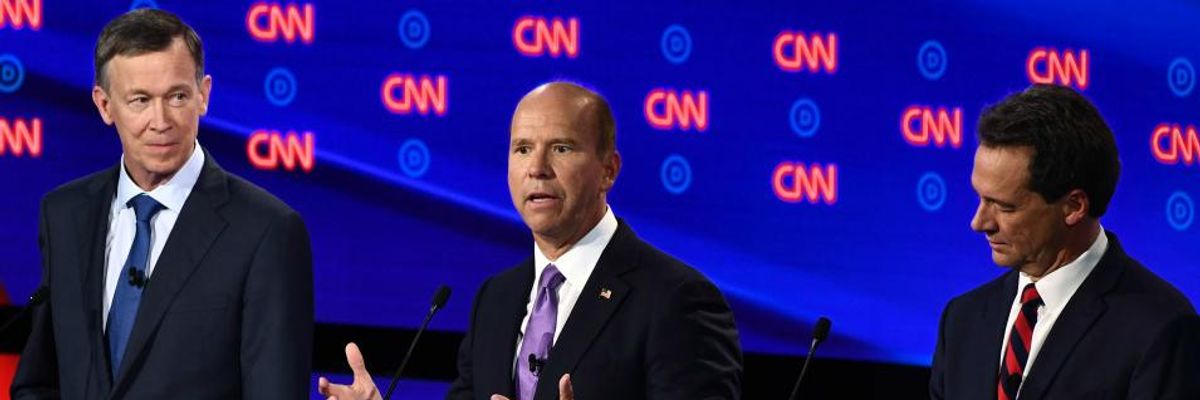In his book Failed States, preeminent linguist Noam Chomsky described the significant gap between the policy positions of the U.S. electorate and their elected "leaders" as a "democracy deficit." That gap, he concluded, is the product of the deceptive manner in which "elections are skillfully managed to avoid issues and marginalize the underlying population...freeing the elected leadership to serve the substantial people."
At its essence, the Bernie Sanders-inspired "political revolution" entails a substantive, issue-driven strategy designed to eliminate the "democracy deficit." It offers a unique vehicle for societal transformation from what President Jimmy Carter described as "an oligarchy with unlimited political bribery" to the realization of the promise offered by President Abraham Lincoln in his Gettysburg Address: "government of the people, by the people and for the people."
As a movement, the "political revolution" can succeed only if progressives come to understand the symbiotic relationship between the corporate public relations industry, commercial media outlets, and the politicians who have been subsumed by corporate wealth and power. This includes the need to identify and expose the methodology deployed by that unholy troika (corporate PR flaks, commercial media and corporatist politicians), to wit, the adroit use of select words and phrases ("talking points") to frame public discourse and to conceal the deceits utilized to persuade the electorate to vote against its own interests.
One of the many deceits the troika deploys is to conceal one of its critical components by referring to corporate-money-compromised Democrats as either "centrists" or "moderates."
"Centrist" implies that the positions held by Democrats who tow the corporate line are mainstream, whereas progressives, who selflessly advance the interests of the vast majority of the electorate, are depicted as "far left."
Issue polls, however, reveal that it is the progressive agenda that is decidedly mainstream.
A poll taken last year revealed that, prior to this year's health insurance/pharmaceutical industry propaganda campaign, 70% of all Americans, including 52% of Republicans and 84% of Democrats, supported Medicare for All. A separate 2018 poll revealed more than eight in ten Americans, 81%, supported a Green New Deal. A whopping 82% of Americans want the federal government to negotiate lower prescription drug prices.
"Moderate" conveys the deceptive notion that those who tow the corporate line are being reasonable, whereas those who aspire to achieve the progressive agenda are--at best--utopian dreamers. The "moderate" descriptor is also used to depict corporatist politicians, like the, wealthy, investment and insurance industry-connected former Rep. John Delaney (D-MD), as "realists." This, in turn, positions the "realist" to derisively dismiss immensely popular progressive policies as unattainable "pie-in-the-sky."
The colloquy regarding Medicare for All that emerged during last week's CNN debates provides an ideal opportunity to dissect the troika and its methodology.
Instead of a robust debate that would permit the electorate to make an informed electoral decision, CNN presented what Julie Hollar of Fairness and Accuracy in Reporting (FAIR) described as an "over the top industry-friendly spectacle."
The two Medicare for All champions on the first debate night, Senators Elizabeth Warren (D-MA) and Bernie Sanders (I-VT), were placed at center stage, literally surrounded by a team of corporate-money-compromised "lower tier" candidates. The time allotted to answer questions was scarcely sufficient to deliver anything more than the industry-friendly sound bites that not only came from the corporatist candidates on stage, but also from well-timed commercial break ads produced by the Orwellian-labeled, Partnership for America's Health Care Future, the newest insurance and pharmaceutical industry-funded PR front group.
Ostensibly objective moderators carefully scripted their questions to ensure that the event would be conducted within an industry-preferred frame.
A recent academic study revealed that the Medicare for All Act, introduced by Sanders and co-sponsored by 14 Senate Democrats, would save $5.1 trillion over the next decade. Yet, the questions Tapper posed about how it would be paid for strongly implied otherwise. Tapper then included bait-and-switch questions, which ignored the reality that minimal "middle class tax increases" would be more than offset by the elimination of premiums, co-pays and deductibles.
The most absurd insurance/pharmaceutical industry talking point was embodied in questions that speciously characterized replacement of the existing, inordinately expensive and dysfunctional for-profit system with a single-payer system as an effort to take away someone's health insurance.
If someone offered you a brand-new Mercedes free of charge, provided you were willing to trade-in your sputtering, old 1965 unsafe at any speed Corvair, would you say, "No way! You want to take my old clunker away"?
The U.S. spends nearly two and one-half times more per capita for healthcare than the average per capita healthcare expenditures among the 34 single-payer nation-members of the Organization for Economic Cooperation and Development (OECD). Yet, according to a 2014 Commonwealth Fund study, the U.S. healthcare delivery system ranked dead last among eleven industrialized nations in terms of "quality, efficiency, access to care, and healthy lives."
Our profit-before-people healthcare system, even under the so-called "Affordable Care Act," often extracts harsh economic tolls from those who have to choose between food and the cost of medicine. Each year, more than 770,000 Americans file for bankruptcy because of unpaid medical bills. Per a 2009, pre-ACA Harvard Medical Study, 45,000 Americans die each year simply because they can't afford coverage.
In single-payer countries, no one dies for lack of coverage or is forced into bankruptcy by reason of unpaid medical bills.
That these ugly truths about the indefensible U.S. healthcare system were, to the extent possible, hidden by commercial media to protect its sponsors, not only during what was supposed to be a "debate," but also during the presentation of nightly "news," should surprise no one. Indeed, the one issue that is likely to be scrupulously avoided during future commercial media-run debates is "media reform."
That doesn't mean that progressives are powerless to recognize, expose, protest and condemn the use of corporate propaganda techniques. At the very least, progressive writers, activists and politicians should not reinforce troika deceptions by repeating their Orwellian descriptions of corporatists as "centrists" and "moderates."
